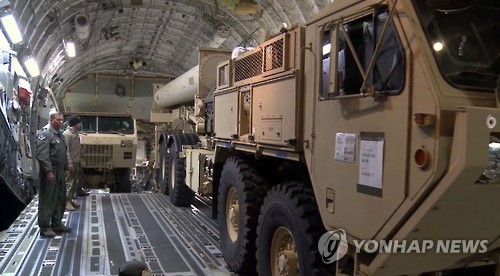A U.S. State Department official said Monday there is no hiccup in the ongoing deployment of a cutting-edge missile defense system in South Korea, dismissing concern about a political setback.
"There hasn't been any change, and there hasn't certainly been anything about the decision-making process that would indicate any change," Susan Thornton, acting assistant secretary of state for East Asian and Pacific affairs, told reporters in a telephone conference. "So we're on track as far as that goes for THAAD deployment."
THAAD is the acronym for Terminal High Altitude Area Defense. It's the most advanced U.S. missile shield composed of a state-of-the-art radar and interceptors to hit incoming missiles.

The allies agreed last year to install a THAAD system in the southeastern town of Seongju, saying it's a must to thwart North Korea's nuclear and missile threats. Some related components are already here.
There has been speculation that the U.S. may delay the deployment process until after South Korea's presidential elections on May 9.
South Koreans are split over the THAAD issue amid a strong backlash, especially from China.
On Monday, South Korea's defense ministry also reaffirmed that there is no change in the plan to position a THAAD unit in South Korea as early as possible. Thornton also warned Pyongyang not to test the Donald Trump administration's resolve.
If it presses ahead with another nuclear test, it "would draw a pretty significant international response," she said without elaborating.
She left the door open for negotiations with the communist nation.
"We are definitely not seeking conflict or regime change," she said. "But we are committed to defending our people and our allies should it be necessary."
North Korea stated that it won't budge at all.
"We'll be conducting more missile tests on a weekly, monthly and yearly basis," Vice Foreign Minister Han Song-Ryol said in an interview with the BBC, a British broadcaster.
"If the U.S. is reckless enough to use military means, it would mean from that very day, an all-out war." (Yonhap)

